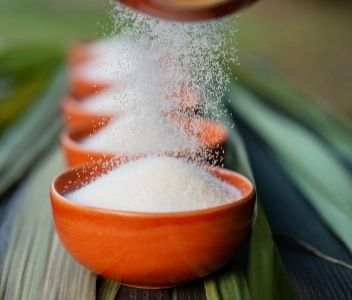Sugar is a versatile commodity available in every household. It is manufactured using Sugarcane and latest technology at top Sugar Mills in India. However, maintaining quality is an important factor for these manufacturers. Branded sugar manufacturers make sure that they offer the best-quality sugar to consumers. This blog discusses a few factors that have an impact on the quality of sugar.
Ash
Purity of sugar is an important factor that should be considered while evaluating the quality of sugar. A good quality sugar has 100% sucrose. Elements like ash, moisture and invert sugar are present in sugar that is impure. Ash is a common term for the inorganic compounds available in sugar. These compounds include alkalis, acids, and other non-sugar substances such as sodium and potassium. High levels of ash increase sucrose loss compromising with the quality. Therefore, strategic solutions are followed by the sugar manufacturers to remove such impurities from the main product.
Moisture
Moisture too contaminates the quality of sugar. Though, the moisture might not contaminate the sugar directly, but, it impacts the storage capabilities of sugar. To make sure that moisture content is minimized in the sugar, the drying process during the manufacturing is important. Moisture reduction process is, thus, followed strictly by the noted sugar brands making sure that the best quality reaches the consumers.
Sulphur Dioxide
SO2 acts as a bleaching agent. Upon exposure to sulphur dioxide, hydrogen sulfide is formed, which eventually causes deterioration. Sugar in the canning industry has a maximum permissible range of 20 ppm because SO2 in sugar dissolves metals such as tin and iron. It is therefore important to monitor the efficient and judicious use of SO2.
Invert Sugar
Invert sugar is a mixture of elements like fructose and glucose. It is sweeter than sugar. It has high solvency than sucrose. These sugars are behind the Millard Reaction (Invert sugar + Amino acids and ash constituents). Millard Reaction is the reaction between reducing sugars and proteins by the impact of heat. It is important to ensure that this content is minimized in the final sugar product that is done by the leading sugar brands.
Insoluble Matter
A large amount of insoluble extraneous matter in sugar affects the quality of the product for industrial consumption because it reduces the rate of clarification for the product and also poses a great deal of hygienic concerns. There are various sources of calcium salts, dust, silica, hair, fibre, bagacillo, carbon, iron, etc. During sediment testing, the quality and contamination source of the sediments are evaluated. Sugar is composed mainly of insoluble matter that includes acids, alkalies, oxalates, and sulfates, but also heavy metals like Sodium, Potassium, Magnesium, iron, copper, and toxic metals such as mercury, cadmium, lead, manganese, & zinc. These metals affect sugar quality even though they are negligible in quantity. Therefore, stringent quality checks are conducted ensuring uncompromised quality of sugar sold to the consumers.
Turbidity
The turbidity in the sugar industry stands for the presence of suspended particles or impurities in sugar juice or syrup obtained from the processing of sugarcane. Turbidity has a negative impact on the quality of sugar. It also creates disruptions at the time of the manufacturing of sugar in a Sugar Plant. For an example, if the sample sugar product has fine particles of calcium sulfate and sulphite, the cost of filtration will increase manifolds. The celebrated sugar manufacturers adhere to color and turbidity meters that provide real-time monitoring of clarifier performance.
Copper/Iron
Small amount of soluble and insoluble copper or iron in sugar can be an important factor to determine the usefulness of sugar for various industrial applications. Excessive amount of these elements can be highly problematic in the production of high-quality sugar. Meticulous checks are conducted to ensure to maintain permissible amounts of these elements by the sugar manufacturing companies.
Conclusion
Producing high-quality sugar that caters to supplier’s expectations is essential. For this purpose, each Indian Sugar Manufacturing Company has to ensure that the purity of sugar is not hampered. For this a good amount of knowledge in the industry is essential. Additionally, utilizing the latest techniques for the improvement of sugar quality is highly essential. Technologies like Filtrate & Syrup clarification by Phospho flotation method, Melt clarification by Phospho flotation process, Clear juice filtration or Filtrate filtration, and Ion Exchange process are used in the manufacturing process for refining the quality of sugar.





Comments